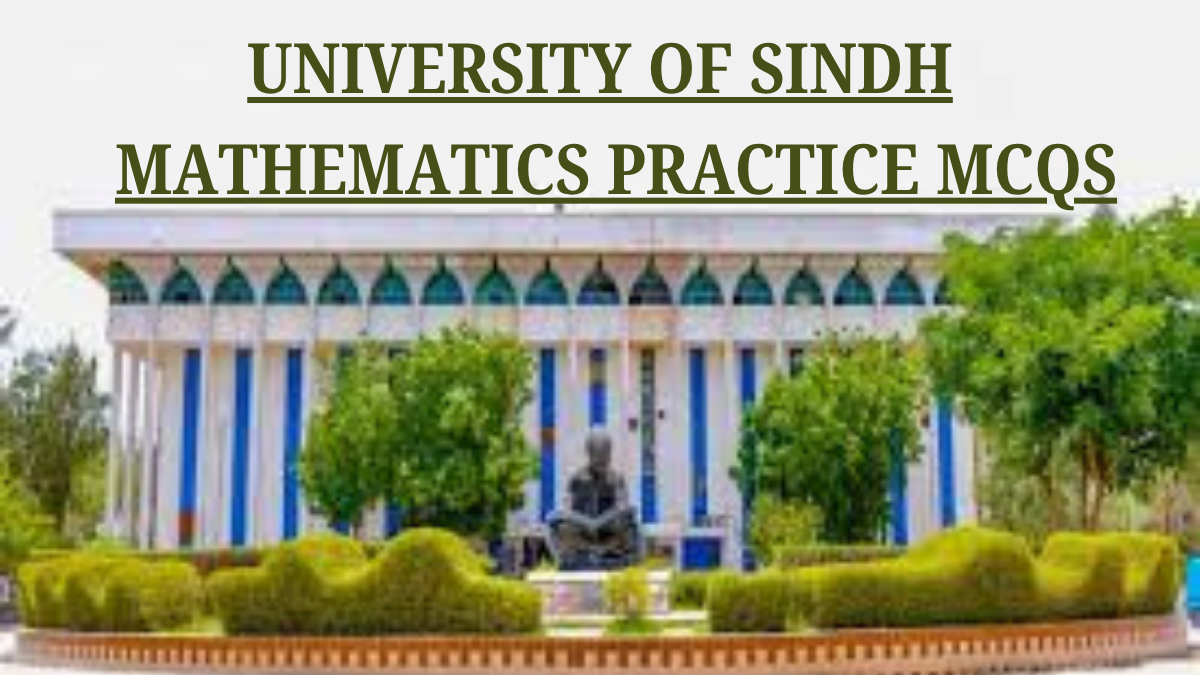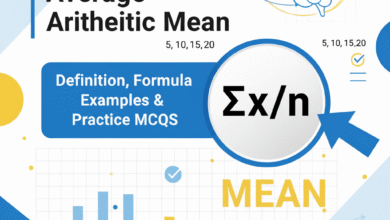What is LCM and HCF? Explained with Examples & Differences

🔹 What is HCF (Highest Common Factor)?
HCF (Highest Common Factor) is the largest number that divides two or more numbers exactly without leaving a remainder.
🧠 HCF in Roman Urdu:
HCF woh sabse bara number hota hai jo do ya zyada numbers ko divide kar sakta hai bina kisi remainder ke.
📌 Example of HCF:
Find HCF of 12 and 18:
- Factors of 12: 1, 2, 3, 4, 6, 12
- Factors of 18: 1, 2, 3, 6, 9, 18
- Common Factors: 1, 2, 3, 6
✅ HCF = 6
🔹 What is LCM (Least Common Multiple)?
LCM (Least Common Multiple) is the smallest number that is a multiple of two or more numbers.
🧠 LCM in Roman Urdu:
LCM woh sabse chhota number hota hai jo do ya zyada numbers ke tables mein common ho.
📌 Example of LCM:
Find LCM of 4 and 5:
- Multiples of 4: 4, 8, 12, 16, 20, 24, …
- Multiples of 5: 5, 10, 15, 20, 25, …
✅ LCM = 20
🔄 Key Differences Between HCF and LCM
| Feature | HCF (Highest Common Factor) | LCM (Least Common Multiple) |
|---|---|---|
| Full Form | Largest number dividing all given numbers | Smallest multiple common to all numbers |
| Meaning | Focuses on common factors | Focuses on common multiples |
| Value | Always smaller than numbers | Always larger than numbers |
| Uses | Simplifying fractions, reducing ratios | Scheduling, finding common timings |
📊 Example Summary (HCF vs LCM for 6 and 8)
- HCF (6, 8) = 2
- LCM (6, 8) = 24
✅ Real-Life Applications of HCF and LCM
🔹 Uses of HCF:
✔ Simplifying fractions (e.g., 12/18 simplifies to 2/3 using HCF 6)
✔ Dividing objects into equal groups
🔹 Uses of LCM:
✔ Finding common meeting times (e.g., two events repeating every 4 & 5 days)
✔ Scheduling tasks (e.g., two machines working at different intervals)
✔ Calculating repeating patterns (e.g., traffic light cycles)
LCM and HCF MCQs – Basic to Advanced Level PRACTICE MCQS WITH EXPLANATION
🔹 LCM & HCF – 5 Basic Level MCQs (Easy Practice Questions)
1. What is the HCF of 12 and 16?
A) 2
B) 4 ✅
C) 6
D) 8
📌 Explanation:
- Factors of 12 = 1, 2, 3, 4, 6, 12
- Factors of 16 = 1, 2, 4, 8, 16
- Common factors = 1, 2, 4 → HCF = 4
2. What is the LCM of 3 and 5?
A) 15 ✅
B) 8
C) 10
D) 30
📌 Explanation:
- Multiples of 3 = 3, 6, 9, 12, 15, …
- Multiples of 5 = 5, 10, 15, 20, …
- First common multiple = 15
3. The HCF of 7 and 13 is:
A) 1 ✅
B) 7
C) 13
D) 91
📌 Explanation:
- 7 and 13 are prime numbers → Only common factor = 1
4. LCM of 6 and 9 is:
A) 18 ✅
B) 36
C) 9
D) 12
📌 Explanation:
- Prime factors:
- 6 = 2 × 3
- 9 = 3 × 3
- LCM = 2 × 3 × 3 = 18
5. HCF of 15 and 25 is:
A) 5 ✅
B) 10
C) 15
D) 1
📌 Explanation:
- Common factors = 1, 5 → HCF = 5
🔴 LCM & HCF – 5 Advanced Level MCQs (Hard Questions)
6. What is the LCM of 8, 12, and 20?
A) 60
B) 80
C) 120 ✅
D) 240
📌 Explanation:
- Prime factorization:
- 8 = 2³
- 12 = 2² × 3
- 20 = 2² × 5
- LCM = 2³ × 3 × 5 = 120
7. HCF of 72 and 120 is:
A) 6
B) 12
C) 24 ✅
D) 48
📌 Explanation:
- Factors of 72 = 1, 2, 3, 4, 6, 8, 9, 12, 18, 24, 36, 72
- Factors of 120 = 1, 2, 3, 4, 5, 6, 8, 10, 12, 15, 20, 24, 30, 40, 60, 120
- Greatest common factor = 24
8. If LCM of 18 and 24 is 72, what is their HCF?
A) 6 ✅
B) 12
C) 8
D) 4
📌 Explanation:
- Formula: LCM × HCF = Product of numbers
- 72 × HCF = 18 × 24 → HCF = 432 ÷ 72 = 6
9. What is the HCF of 36, 60, and 72?
A) 6
B) 12 ✅
C) 18
D) 24
📌 Explanation:
- Common factors = 1, 2, 3, 4, 6, 12 → HCF = 12
10. Find the smallest number divisible by 8, 9, and 12:
A) 72
B) 96
C) 144 ✅
D) 360
📌 Explanation:
- LCM(8, 9, 12) = 2³ × 3² = 144
LCM & HCF Word Problems – MATH MCQs with Solutions
📌 LCM & HCF Word Problem MCQs
1. Rope Cutting Problem
Q: Two ropes of lengths 60 cm and 72 cm need to be cut into equal pieces. What is the maximum possible length of each piece?
Options:
A) 12 cm ✅
B) 15 cm
C) 18 cm
D) 24 cm
📌 Solution:
- This is an HCF (Highest Common Factor) problem since we need the largest equal length that divides both ropes.
- Factors of 60: 1, 2, 3, 4, 5, 6, 10, 12, 15, 20, 30, 60
- Factors of 72: 1, 2, 3, 4, 6, 8, 9, 12, 18, 24, 36, 72
- Common Factors: 1, 2, 3, 4, 6, 12
✔ Greatest possible length = HCF = 12 cm
Q: What is the smallest number divisible by 6, 8, and 9?
Options:
- A) 48
- B) 72 ✅
- C) 96
- D) 144
📌 Step-by-Step Solution
1. Understanding LCM
The LCM of multiple numbers is the smallest number that is a multiple of each of them. To find it, we use prime factorization.
2. Prime Factorization
First, break each number into its prime factors:
- 6 = 2 × 3
- 8 = 2 × 2 × 2 = 2³
- 9 = 3 × 3 = 3²
3. Calculating LCM
The LCM is found by taking the highest power of each prime factor present in the numbers:
- Highest power of 2: 2³ (from 8)
- Highest power of 3: 3² (from 9)
Now, multiply them together: LCM=23×32=8×9=72LCM=23×32=8×9=72
4. Verification
- 72 ÷ 6 = 12 (exact division)
- 72 ÷ 8 = 9 (exact division)
- 72 ÷ 9 = 8 (exact division)
Since 72 is divisible by all three numbers, it is the correct answer.
🔹 Why Not Other Options?
- A) 48 → Divisible by 6 and 8, but 48 ÷ 9 ≈ 5.33 (not exact) ❌
- C) 96 → Divisible by 6 and 8, but 96 ÷ 9 ≈ 10.66 (not exact) ❌
- D) 144 → Divisible by all, but not the smallest (72 is smaller) ❌
LCM and HCF Problem Solving: Find the Missing Number
Understanding the Relationship Between LCM and HCF
When working with two numbers, their Least Common Multiple (LCM) and Highest Common Factor (HCF) have a special mathematical relationship that can help us solve problems efficiently.
The Key Formula:
For any two numbers: LCM (a,b) × HCF (a,b) = a×b LCM (a,b)×HCF (a,b)=a×b
Q: Two numbers have LCM = 84 and HCF = 7. If one number is 21, find the other number.
Options:
- A) 28 ✅
- B) 35
- C) 42
- D) 56
📌 Step-by-Step Solution
1. Understand Given Values
- LCM of two numbers = 84
- HCF of two numbers = 7
- First number (a) = 21
- Second number (b) = ?
2. Apply the Fundamental Formula
Using the relationship:LCM(a,b)×HCF(a,b)=a×bLCM(a,b)×HCF(a,b)=a×b84×7=21×b84×7=21×b
3. Solve for the Unknown Number (b)
588=21×b588=21×bb=58821=28b=21588=28
4. Verification
Let’s verify:
- HCF of 21 and 28:
- Factors of 21: 1, 3, 7, 21
- Factors of 28: 1, 2, 4, 7, 14, 28
- Common factors: 1, 7 → HCF = 7 ✔
- LCM of 21 and 28:
- Prime factors:
- 21 = 3 × 7
- 28 = 2² × 7
- LCM = 2² × 3 × 7 = 4 × 3 × 7 = 84 ✔
- Prime factors:
🔹 Why Other Options Are Incorrect?
- B) 35 → LCM(21,35)=105 ≠ 84 ❌
- C) 42 → HCF(21,42)=21 ≠ 7 ❌
- D) 56 → LCM(21,56)=168 ≠ 84 ❌
